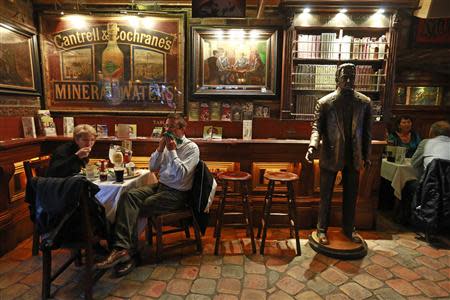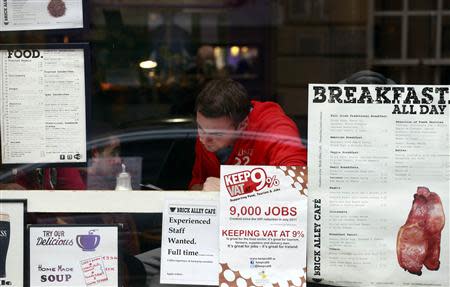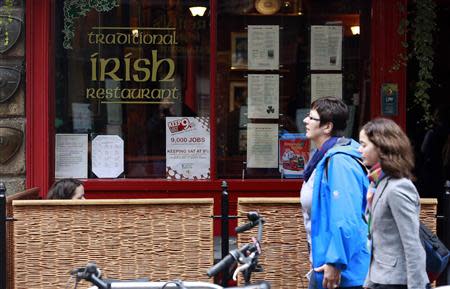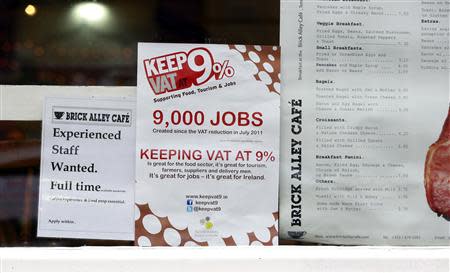Ireland's tourism sector fears having to go it alone
By Padraic Halpin DELGANY, Ireland (Reuters) - Reducing sales tax for Irish hotels, restaurants and other tourist businesses has paid dividends, a fact the country's finance minister was reminded of upon checking into his hotel room for a party conference last month. The initiative created over 15,000 jobs in two years and helped visitors to Ireland rise by over six percent this year, the minister and other members of his Fine Gael party were told in carefully-placed pamphlets by the Irish Hoteliers Federation. But with a seventh round of austerity in five years on the way in next week's budget, Michael Noonan is not sure he can find the cash for an extension. In the popular tourist county of Wicklow, restaurateurs say he risks undermining one of the few economic bright spots. "Things have definitely stabilized but food prices have gone up astronomically, our electricity and gas bills are higher and the price you can get per dish has come down so there's the math," said Emma Stone, owner of the Romany Stone restaurant in Delgany. "You've already hit our customers in their pay, I've been hit as a director of the company and now you're going to hit the VAT rate? It's perception and people will just stop spending." Though not as a big a contributor to the economy as it is in Spain or Greece, tourism is more employment-intensive than the robust export sector. Hotels and restaurants employ almost as many people as the nearly one in ten who work for foreign firms like Google, Apple and Pfizer. It has also been given a kickstart by a year-long government campaign to lure visitors with Irish roots. 'The Gathering' has seen North American tourists rise by a massive 16.5 percent. Yet while Romany Stone opened its doors in May, Delgany remains tarnished by empty shop fronts like so many other one-street villages throughout Ireland, the wreckage left behind by an economic crash that led to an EU/IMF bailout three years ago. Even as that bailout comes to an end, the domestic economy remains fragile. Consumer sentiment is at a six-year high, unemployment a 3-1/2-year low but consumer spending is set to fall for the sixth successive year and the economy is in danger of stagnating. ENGINES FIRING? The government is banking on a resumption of strong export growth next year to return economic growth to the 2 percent seen in 2011. Analysts say it will be the performance of trade partners - not the country's restaurants and hotels - that will determine how smooth a bailout exit Ireland makes. "If someone waved a magic wand and made me finance minister in the morning, I'm not sure how I'd deal with it myself because it's an exceptionally tough call," said Eoin Fahey, chief economist with Kleinwort Benson Investors. "But right now I wouldn't say that I would cut my forecasts because I and other forecasters have the VAT hike built in and the number of jobs that have been created, while substantial, are probably not enough to move the dial significantly." However if euro zone recovery does not arrive as fast or as solidly as Ireland needs, the domestic economy will have to pick up the slack at a time when Ireland needs growth of between 2 and 3 percent to put its debt on a sustainable path. The finance ministry on Tuesday slashed its 2013 growth forecast to 0.2 percent from an estimate of 1.3 percent made six months ago on shrinking domestic demand and exports and cut its 2014 forecast to 1.8 percent from 2.4 percent. The IMF, which warned last week that a further slowdown risked pushing Ireland's national debt to a high of 127 percent of GDP in 2015 and not the 123 percent peak forecast for this year, sees domestic demand rising by just 0.3 percent in 2014. In such a precarious environment, the hospitality sector is begging Noonan not to strip it of its momentum. Responsible for over one in every four of the new jobs that have helped bring unemployment down to almost 13 percent from above 15, it promises another 5,000 posts will be added next year if the VAT rate does not return to 13.5 percent. Having breathed life into a sector that was forgotten about during the boom years with a rare piece of stimulus, the canny finance minister has an important balance to strike next week. "The 9 percent VAT rate was a pump-priming exercise," Noonan told parliament last week. "Like all pump-priming exercises, one primes the pump, the engine fires and when the engine is going, one does not need to prime the pump again. We must measure whether the industry can now go without special measures." (Editing by Mike Peacock)




